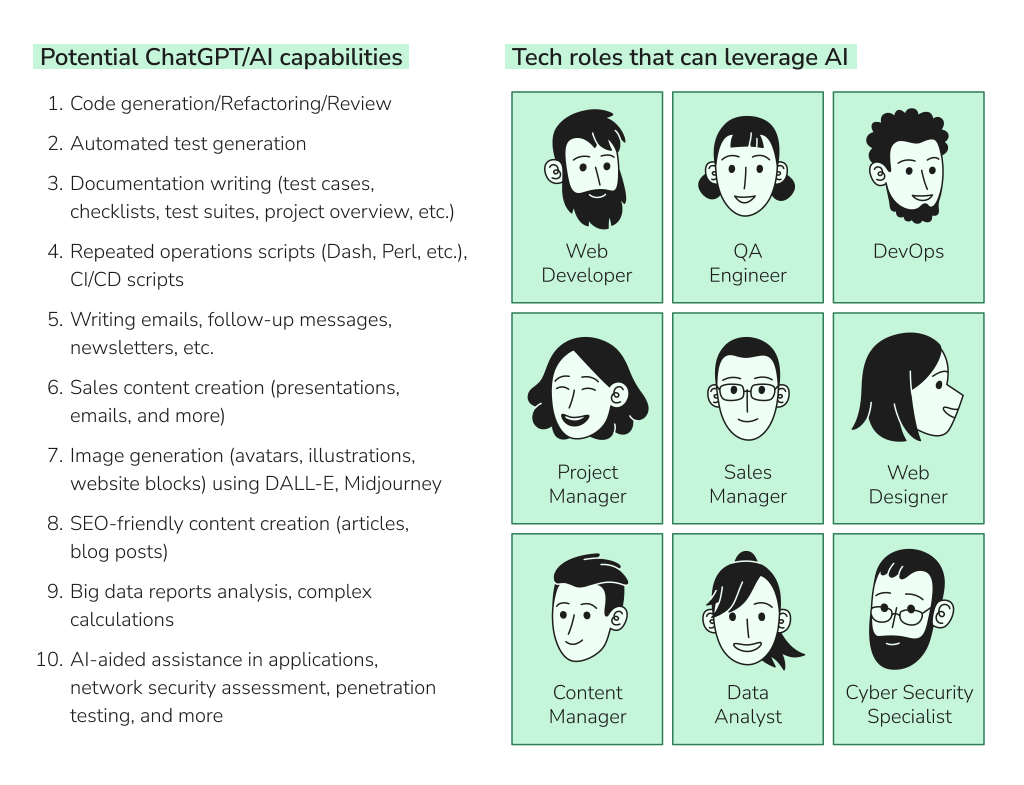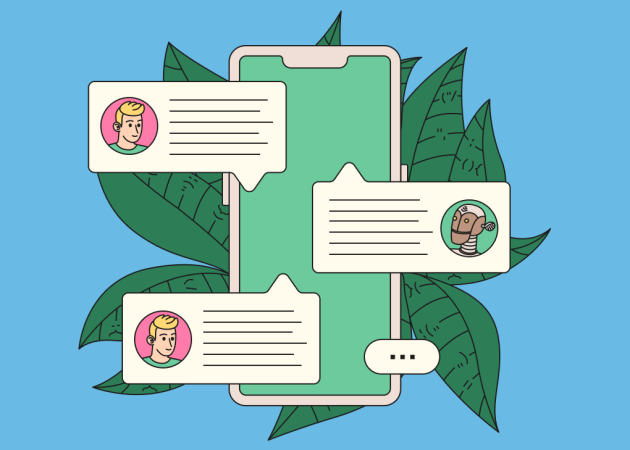
ChatGPT in Tech Workflows: A Team Leader’s Guide 2025
Contents
Contents
As of 2025, ChatGPT is used by over 180 million people worldwide, with integrations spanning customer support systems, enterprise platforms, coding tools, and even creative industries. Alongside tools like GitHub Copilot, Midjourney, Claude, and Gemini, it represents a growing ecosystem of AI solutions that are becoming everyday companions in tech workflows. Businesses across sectors are increasingly adopting AI tools as practical productivity boosters and innovation drivers. From automation to problem-solving and customer interaction, the technology continues to reshape how teams work.
At Beetroot, we’re observing this shift firsthand, with growing demand for AI agent development services. We’re also seeing more enterprises turn to our hands-on “GenAI for Productivity” and “GenAI for Developers” workshops, designed to help both tech and non-tech teams use AI effectively in their workflows.
While the rise of AI has sparked plenty of debate, our experience shows that the best approach is to explore, experiment, and integrate it responsibly. This article brings together practical insights and real-world use cases from our tech team to help businesses, developers, and team leaders get the most out of generative AI, both now and in the future.
Beetroot’s Experience Using Generative AI in Daily Work
As with most of our workshops, Beetroot experts share not only theory but also insights drawn from direct experience—and this time was no exception.
For instance, Alex Yakubenko shared in his webinar how he uses ChatGPT in his daily work. With over nine years in the field, Alex focuses on data scraping software, SEO tools, server operations, and process automation.
ChatGPT is a superb asset for creating documentation you find in algorithms, and even plays a vital role as a programming assistant. It offers real-time guidance and suggestions throughout the entire development process.
Alex uses ChatGPT for:
- Learning new technologies like programming languages, frameworks, and advanced code practices
- Automating routine tasks such as code generation, refactoring, and writing Unit/E2E tests—freeing up time to focus on more complex issues
- Creating documentation for project modules and code blocks
Among the benefits of using ChatGPT in daily work, Alex highlights its adaptability to specific project needs, the time it saves, the quality of its outputs, and the new approaches it encourages.
In his workshop, he also mentioned several practical cases—including one where 98% of his presentation was generated using ChatGPT. On a more technical note, he described integrating ChatGPT into several messenger chatbots via OpenAI’s API, all without writing a single line of code.
His team also kicked off a pet project focused on AI-powered content generation, helping Beetroot clients improve productivity, streamline content workflows, and reduce costs.
As a developer who spent almost a decade in the field without leveraging AI, I wouldn’t view ChatGPT or similar AI technologies as a panacea. However, it is crucial to adopt such tools since they open up plenty of opportunities for developers and businesses alike.
Opportunities of Generative AI for Tech Specialists and Team Leaders
Generative AI solutions have significantly streamlined routine tasks across various sectors, prompting businesses to evaluate their impact. Recent studies underscore the profound influence of AI tools on productivity and economic growth:
- Employee readiness vs. leadership action. A January 2025 McKinsey report highlights a significant gap in AI adoption within organizations. While nearly all companies are investing in AI, only 1% of leaders consider their companies mature in AI deployment, indicating that the primary barrier to scaling AI is not employee readiness but a lack of decisive leadership.
- Time savings and productivity gains. A February 2025 analysis by the St. Louis Federal Reserve found that workers using generative AI reported saving 5.4% of their work hours in the previous week, suggesting a 1.1% increase in aggregate productivity. For a 40-hour workweek, this equates to approximately 2.2 hours saved per week.
- Practical impact at the team level. Insights from Beetroot’s genAI workshops highlight the value of hands-on interaction and shared learning. “The workshop gave me a good overview of different AI tools and the possibilities of creating with them,” shared a software developer from a Swedish automotive company. For professionals across industries, learning from real use cases is proving essential in identifying where AI can make a real difference.
Alex Yakubenko also summed up the opportunities of ChatGPT for developers in the infographic below.

Essential Skills and Strategies for Working Effectively with ChatGPT
Using ChatGPT effectively requires more than technical know-how. It also means understanding the model’s capabilities, its limitations, and how to collaborate with it meaningfully. Here are the key skills and approaches that can help teams make the most of generative AI:
Critical Thinking
It’s essential to evaluate the model’s responses with a critical eye. This includes fact-checking, identifying possible biases, considering the broader context of the task, and recognizing uncertainty when it arises.
Understanding AI Fundamentals
Having a basic grasp of natural language processing (NLP), deep learning, and machine learning helps users better understand how the model works. This knowledge allows for more accurate use and troubleshooting when needed.
Effective Prompting
The way a prompt is written directly impacts the response. Good prompting requires clarity, focus, and context. Users can experiment with open-ended or specific instructions, iterate on prompts, and explore various strategies depending on the task.
Recognizing Limitations
Knowing where the model may fall short is just as important as understanding what it can do. Awareness of these limitations helps avoid misinformation, supports ethical usage, and ensures human oversight when needed.
Collaboration Between Humans and AI
AI tools like ChatGPT are most effective when paired with human expertise. A collaborative approach—where AI augments human input rather than replaces it—often leads to better problem-solving and more innovative outcomes.
Creating a Learning-First Culture
Teams benefit from a culture that encourages experimentation and continuous learning. Support from leadership, access to training, knowledge-sharing, and internal AI-focused events can all contribute to making AI adoption a long-term success.
Integrating AI tools like ChatGPT into team workflows
To do so, businesses and organizations need to develop clear AI integration strategies that involve the following:
- Establishing clear communication channels;
- Fostering cross-functional collaboration;
- Promoting regular feedback to refine the model’s performance;
- Providing user training and guidelines;
- Integrating ChatGPT with existing tools;
- Encouraging pilot projects for gradual adoption.
By combining these skills and approaches, tech teams can effectively and responsibly utilize ChatGPT and other AI tools for better project results and overall organizational growth.

ChatGPT vs. Developers. Will AI replace programmers?
The speed at which AI models evolve has naturally caused concerns in the tech industry. However, experts in the field are typically quite definitive in their answer to the question, “Will AI replace developers?”.
As Alex points out, even ChatGPT denies this theory when asked the question. Here is the model’s exact answer:
“While AI tools can automate repetitive tasks, enhance productivity, and provide valuable insights, developers remain integral to software development. The collaborative relationship between developers and AI tools will likely become the most effective approach, leveraging the strengths to create innovative, efficient, and user-centric software solutions. Developers can harness the potential of AI tools to focus on higher-level design, architecture, and strategic decision-making. At the same time, AI assists in automating routine tasks and providing valuable support throughout the development lifecycle.”
We can’t know what the future holds for us for sure. However, as of 2025, ChatGPT and other AI services should be viewed as tools to empower web developers, not replace them.
Solutions like ChatGPT or GitHub Copilot allow programmers to explore new coding patterns, strategies, and industry practices. Therefore, junior developers can use these services as virtual mentors that guide them through coding challenges. For middle and senior programmers, AI solutions can become assistants that help streamline straightforward tasks, allowing the specialists to focus on creative and complex operations.
The Role of Tech Team Leaders in Utilizing AI Effectively
Embracing AI technology within teams is possible when everyone is on board with the idea, especially the people who are in the lead since they are the ones who need to provide guidance, support, and resources required.
The role of tech team leaders in mentoring and guiding junior developers who are expected to embrace AI tools covers the following aspects:
- Educating the team about AI concepts, including machine learning, natural language processing, AI model architectures, and data pre-processing to ensure they understand the principles and techniques underlying AI technologies.
- Identifying AI use cases within the organization and ensuring AI applications align with its business goals and domain-specific requirements.
- Guiding model selection, fine-tuning, and evaluation to help the team choose and adjust the AI tool so that it suits the project’s purpose.
- Providing access to AI tools and resources like AI libraries, frameworks, data science platforms, cloud-based AI services, pre-trained models and datasets, tutorials, documentation, learning and collaborative platforms, etc.
- Addressing ethical AI issues and emphasizing the importance of responsible AI practices that mitigate bias, privacy hazards, etc.
- Fostering a culture of experimentation and continuous learning within the team by supporting AI-related projects and providing guidance, feedback, and support in overcoming challenges.
- Sharing best industry practices to help developers avoid common pitfalls and optimize their experience with AI tools.
With proper guidance and support from their leaders, tech teams can embrace AI projects, utilize the technology to the fullest, and thus drive progress within their organizations.
Beyond Team Productivity: Opportunities Offered by AI Agents
In 2025, it’s clear that generative AI is becoming an essential part of modern digital transformation. As organizations explore how to make the most of this technology, the conversation is shifting from “if” to “how” we adopt AI in a way that brings meaningful value. Here are several ways businesses can begin doing just that.
1. Leveraging AI Agents for Competitive Advantage
AI agents offer a step up from traditional chatbots. While chatbots are great for managing simple, repetitive tasks, agents can process complex requests, understand nuance, and take autonomous actions. As Vitalii Huliai, Tech/Team Lead at Beetroot, pointed out in our webinar on AI chatbots and agents,
Rather than following trends or automating for the sake of it, the goal is to implement solutions that make a real difference.
Businesses that embrace AI agents can unlock:
- Hyper-personalized user experiences
- Smarter and faster internal workflows (e.g., data triage, onboarding support)
- AI-assisted decision-making in operations, marketing, and customer service
At Beetroot, we’ve seen the potential of agents in a range of business cases. They’re not just about answering questions—they can help your team move faster, make smarter decisions, and personalize the experience for users and clients.
2. Embedding AI Agents in Digital Transformation Initiatives
AI agents can be a natural fit for digital transformation efforts. Our tech team has explored applications like automating documentation, supporting DevOps processes, and simulating user behavior for more efficient UX testing. These examples reflect how AI agents can become valuable team players across functions — supporting, not replacing, the humans behind the work.
Industries where AI agents are already making an impact include:
-
Healthcare: reducing admin workload for medical staff
- Fintech: improving customer support and fraud detection
- Retail: streamlining operations and enhancing customer experiences
3. Supporting Ongoing Learning and Upskilling
AI adoption is, in the end, not about tools — it’s about people. In our tech training programs for teams, we’ve worked with professionals across industries to build confidence and skills in using generative AI effectively.
From learning the basics of prompt design to building functional AI workflows, participants walk away with practical knowledge they can apply right away. This kind of internal capability building is what helps companies move from isolated experiments to real transformation.
4. Putting People at the Center
In many cases, the best outcomes of AI usage come from hybrid setups where AI handles the first steps and human specialists step in when deeper expertise or emotional understanding is needed.
One example from our recent work involved building an AI-powered support tool that handles routine inquiries and routes more complex ones to human agents. The result? More efficient operations and better user satisfaction, all while keeping the human connection intact.
5. Building for Scalability and Future Growth
Scalability is one of the biggest challenges in AI adoption. It’s critical for companies to develop technical foundations that make it easier to scale responsibly and sustainably.
From our experience, that includes designing modular architectures, using cloud infrastructure that adjusts to demand, and relying on tools like Docker and Kubernetes for smoother deployment. We also help teams set up performance monitoring and feedback loops to ensure that their AI systems evolve in line with business needs.
From Potential to Practice: Let’s Build With AI
While we can’t know exactly how AI will evolve over the next two decades, it’s already showing real potential to support innovation and boost efficiency in tech teams today.
At Beetroot, we see AI as a tool to help people do their best work. Our approach focuses on creating practical, sustainable solutions that align with real-world needs and long-term goals. Whether it’s improving internal workflows or developing user-facing products, we aim to keep the human perspective at the center of the process.
If you’re exploring how to use AI meaningfully in your work, we’re happy to share what we’ve learned and help you take the next step.
Subscribe to blog updates
Get the best new articles in your inbox. Get the lastest content first.
Recent articles from our magazine
Contact Us
Find out how we can help extend your tech team for sustainable growth.





